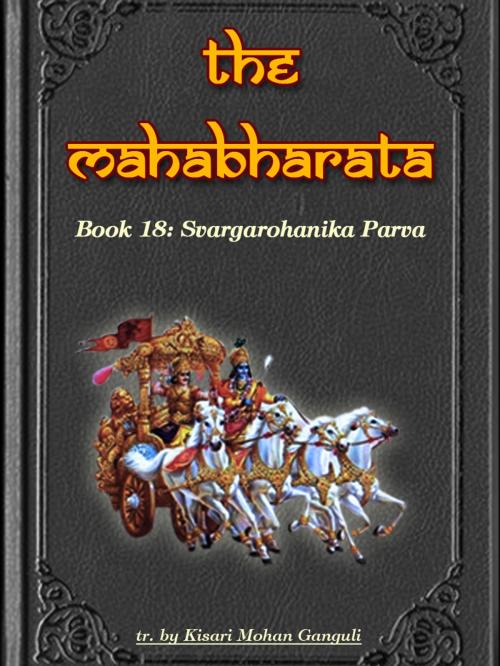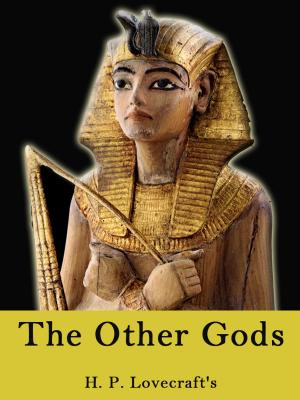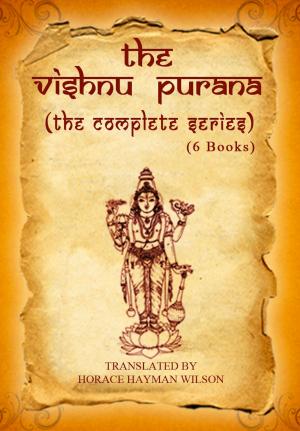The Mahabharata, Book 18: Svargarohanika Parva
Nonfiction, Religion & Spirituality, Eastern Religions, Hinduism, Inspiration & Meditation, Spirituality, History| Author: | Kisari Mohan Ganguli | ISBN: | 1230000036283 |
| Publisher: | AppsPublisher | Publication: | December 3, 2012 |
| Imprint: | Language: | English |
| Author: | Kisari Mohan Ganguli |
| ISBN: | 1230000036283 |
| Publisher: | AppsPublisher |
| Publication: | December 3, 2012 |
| Imprint: | |
| Language: | English |
The Mahabharata, Book 18: Svargarohanika Parva
Kisari Mohan Ganguli, tr.
Om! Having bowed down to Narayana, and Nara the foremost of male beings, and the goddess Saraswati also, must the word Jaya be uttered.
It is of immense importance to the culture of the Indian subcontinent, and is a major text of Hinduism. Its discussion of human goals (artha or purpose, kama or pleasure, dharma or duty/harmony, and moksha or liberation) takes place in a long-standing tradition, attempting to explain the relationship of the individual to society and the world (the nature of the 'Self') and the workings of karma.
The object of a translator should ever be to hold the mirror upto his author. That being so, his chief duty is to represent so far as practicable the manner in which his author's ideas have been expressed, retaining if possible at the sacrifice of idiom and taste all the peculiarities of his author's imagery and of language as well. In regard to translations from the Sanskrit, nothing is easier than to dish up Hindu ideas, so as to make them agreeable to English taste. But the endeavour of the present translator has been to give in the following pages as literal a rendering as possible of the great work of Vyasa. To the purely English reader there is much in the following pages that will strike as ridiculous. Those unacquainted with any language but their own are generally very exclusive in matters of taste. Having no knowledge of models other than what they meet with in their own tongue, the standard they have formed of purity and taste in composition must necessarily be a narrow one. The translator, however, would ill-discharge his duty, if for the sake of avoiding ridicule, he sacrificed fidelity to the original. He must represent his author as he is, not as he should be to please the narrow taste of those entirely unacquainted with him. Mr. Pickford, in the preface to his English translation of the Mahavira Charita, ably defends a close adherence to the original even at the sacrifice of idiom and taste against the claims of what has been called 'Free Translation,' which means dressing the author in an outlandish garb to please those to whom he is introduced.
Janamejaya said, "Having attained to Heaven, what regions were respectively attained by my grandsires of old, viz., the Pandavas and the sons of Dhritarashtra? I desire to hear this. I think that thou art conversant with everything, having been taught by the great Rishi Vyasa of wonderful feats.
Vaishampayana said, "Listen now to what thy grandsires, Yudhishthira and others, did after having attained to Heaven, that place of the deities. Arrived at Heaven, king Yudhishthira the just, beheld Duryodhana endued with prosperity and seated on an excellent seat. He blazed with effulgence like the sun and wore all those signs of glory which belong to heroes. And he was in the company of many deities of blazing effulgence and of Sadhyas of righteous deeds. Yudhishthira, beholding Duryodhana and his prosperity, became suddenly filled with rage and turned back from the sight.
"He loudly addressed his companions, saying, ‘I do not desire to share regions of felicity with Duryodhana who was stained by cupidity and possessed of little foresight. It was for him that friends, and kinsmen, over the whole Earth were slaughtered by us whom he had afflicted greatly in the deep forest. It was for him that the virtuous princess of Pancala, Draupadi of faultless features, our wife, was dragged into the midst of the assembly before all our seniors. Ye gods, I have no desire to even behold Suyodhana. I wish to go there where my brothers are.’
The Mahabharata, Book 18: Svargarohanika Parva
Kisari Mohan Ganguli, tr.
Om! Having bowed down to Narayana, and Nara the foremost of male beings, and the goddess Saraswati also, must the word Jaya be uttered.
It is of immense importance to the culture of the Indian subcontinent, and is a major text of Hinduism. Its discussion of human goals (artha or purpose, kama or pleasure, dharma or duty/harmony, and moksha or liberation) takes place in a long-standing tradition, attempting to explain the relationship of the individual to society and the world (the nature of the 'Self') and the workings of karma.
The object of a translator should ever be to hold the mirror upto his author. That being so, his chief duty is to represent so far as practicable the manner in which his author's ideas have been expressed, retaining if possible at the sacrifice of idiom and taste all the peculiarities of his author's imagery and of language as well. In regard to translations from the Sanskrit, nothing is easier than to dish up Hindu ideas, so as to make them agreeable to English taste. But the endeavour of the present translator has been to give in the following pages as literal a rendering as possible of the great work of Vyasa. To the purely English reader there is much in the following pages that will strike as ridiculous. Those unacquainted with any language but their own are generally very exclusive in matters of taste. Having no knowledge of models other than what they meet with in their own tongue, the standard they have formed of purity and taste in composition must necessarily be a narrow one. The translator, however, would ill-discharge his duty, if for the sake of avoiding ridicule, he sacrificed fidelity to the original. He must represent his author as he is, not as he should be to please the narrow taste of those entirely unacquainted with him. Mr. Pickford, in the preface to his English translation of the Mahavira Charita, ably defends a close adherence to the original even at the sacrifice of idiom and taste against the claims of what has been called 'Free Translation,' which means dressing the author in an outlandish garb to please those to whom he is introduced.
Janamejaya said, "Having attained to Heaven, what regions were respectively attained by my grandsires of old, viz., the Pandavas and the sons of Dhritarashtra? I desire to hear this. I think that thou art conversant with everything, having been taught by the great Rishi Vyasa of wonderful feats.
Vaishampayana said, "Listen now to what thy grandsires, Yudhishthira and others, did after having attained to Heaven, that place of the deities. Arrived at Heaven, king Yudhishthira the just, beheld Duryodhana endued with prosperity and seated on an excellent seat. He blazed with effulgence like the sun and wore all those signs of glory which belong to heroes. And he was in the company of many deities of blazing effulgence and of Sadhyas of righteous deeds. Yudhishthira, beholding Duryodhana and his prosperity, became suddenly filled with rage and turned back from the sight.
"He loudly addressed his companions, saying, ‘I do not desire to share regions of felicity with Duryodhana who was stained by cupidity and possessed of little foresight. It was for him that friends, and kinsmen, over the whole Earth were slaughtered by us whom he had afflicted greatly in the deep forest. It was for him that the virtuous princess of Pancala, Draupadi of faultless features, our wife, was dragged into the midst of the assembly before all our seniors. Ye gods, I have no desire to even behold Suyodhana. I wish to go there where my brothers are.’















